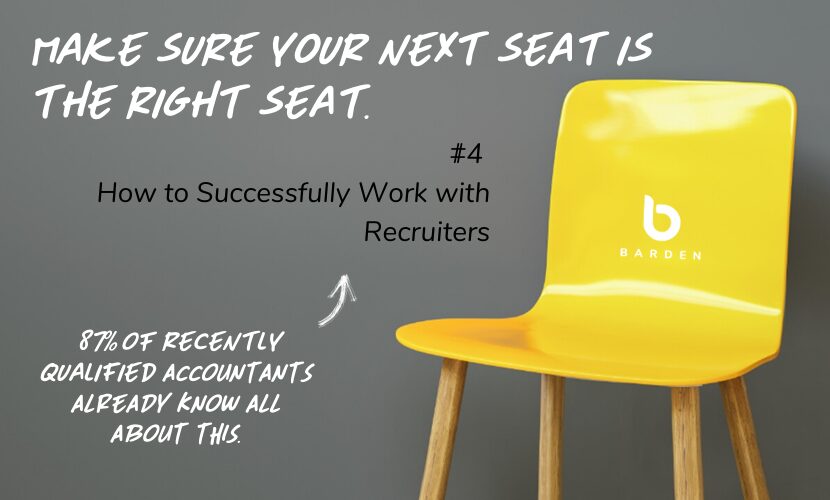As you look for the next step in your career over the coming months you will come across different types of recruitment consultants or, in some cases, you may even deal directly with HR. Whoever you deal with, here are a few basics you really should know.
Firstly, a good recruitment consultant can be a great asset as you work through the many stages of your career. Identifying a great consultant amid the mass of recruitment firms can be tricky and requires both patience and persistence. While Google or LinkedIn will present you with an almost endless list of firms and contacts, the best way to identify a good recruitment consultant is through word-of-mouth referrals. Talk to respected colleagues or acquaintances about their experience of the world of recruitment and ask for recommendations.
#1 The initial consultation: You will ideally engage with two or three respected recruitment consultants and spend some time explaining your background and ambitions. In order to get the most out of this initial consultation – come prepared. Prior to the meeting, you should consider what you do, and more importantly do not, want in a prospective role and be able to communicate that clearly to the consultant. If you have read our previous pieces on organisational structure and role type, you should have a clear idea of what you ideally want to do next.
Salary should also be discussed at the initial consultation and it’s vital that you’re both honest and realistic about your expectations. Salary will change over time and trying to make great one-off strides in this area is unrealistic in most cases, especially if you are making your first step from practice into industry.
Also, salary should be a secondary consideration as your focus ought to be on the overall remuneration package. If a role is on the table, consider the monetary and non-monetary benefits and counter that with the cost of your commute in terms of both cost and length/distance. Also, as a recently qualified accountant you will likely be learning a lot in your next role – keep in mind that you have a long career ahead of you, so learning and earning need to be kept in balance.
It’s important to note at this point that recruitment consultants generally handle hundreds of CVs each week, so you shouldn’t expect to be their sole focus. Instead, establish clear expectations, keep communication open and honest and acknowledge that the process is a shared responsibility.
#2 The trusted advisor vs the commodity recruiter: Not all recruitment consultants are made equal. There can be a huge disparity in how consultants interact with people and just a handful will take the advisory approach, while the remainder will be largely focused on filling vacancies.
If your consultant is more advisory in nature, she or he will want to hear about your career preferences and expectations. Trust usually builds naturally and such consultants can be invaluable as they will give you genuine advice and insights – not just jobs – and could become lifelong assets as you develop your career and build your own teams. These consultants want to help you with every step in your career, not just on this once off occasion.
If your consultant is more transactional in nature, you will need to request more detail about the role as they will likely be selling their client, not trying to support your career. It would be wise to consult your network for information on the company’s culture and the team in which the role sits. There are also some things to avoid – don’t be coerced into applying for a role you’re not interested in and don’t feel obliged to accept an offer right there and then. Your end goal is to secure the best outcome for you – not for them.
Different consultants have different agendas, but knowing this can help you better manage the job application process and maintain a necessary degree of control.
#3 Dealing direct: On occasion, you may find yourself dealing directly with a HR person or recruiter in a company. Once you enter a direct recruitment process with an organisation, you must bear in mind that the organisation is duty-bound to look after its own best interests, so it’s important that you seek out the most objective insights and advice possible.
You could invite a current or former employee for coffee and ask if they would recommend the organisation, what they enjoyed or disliked about their time there, the reality about career progression and so on. But beware of disgruntled employees! You can mitigate this risk by talking to multiple sources with links to the organisation, as the more people you speak with, the more rounded (and more balanced) your understanding will be. It might sound like a lot of work but when you consider that you will spend roughly 90,000 hours at work in your lifetime, it’s a worthwhile investment! If you are lucky enough to know a recruiter that you trust they might be willing to help you out, even if they are not involved in the process.
Before we wrap up there are a few other things you really should know:
- A recruiter should never send your CV to a company without your permission and you should never give permission without first understanding the context of the role and responsibilities. Beware of the “You applied for the job online so I sent it to the company” trick! That should be a big red flag for you.
- Never permit your CV to be submitted to the same company from multiple sources. The process can get very messy for the recruitment consultant and hiring manager if you don’t abide by this rule, and it won’t reflect well on you either.
- Don’t put your CV forward for roles you are not interested in simply to use interviews as an opportunity to practice your technique. The finance world is a small; the hiring manager you left a poor impression with in this recruitment process could be the same hiring manager you meet years down the line for a job you really want. Think about the long-term and don’t compromise your own personal brand.
- You should keep a list of who sent what to whom and when. Take responsibility for following up with consultants for feedback and updates.
Keep in mind that a good recruiter should be able to give you excellent interview preparation – insights into the team, where to focus your attention on the company annual report, prep for competency based interviews and a whole lot more. If you choose your recruiter wisely they can give you a competitive advantage in your career and be a tremendous asset in your job search. Not-so-good recruiters can be too, provided you get access to the roles you want.
In summary, proceed with caution, choose your allies wisely and, critically, get the measure of the person that is representing you so that you know where you stand.
Coming out of your training contract in 2020? Do you want to make sure you make the very best first step after qualifying? Do you want a coffee meeting with a specialist recruitment consultant; someone who is a qualified accountant, just like you (meet some of our team here >>>)? Do you want a little help to create your very own Barden Career Model? No problem. Just drop us a line today on hello@barden.ie and we will take it from there. Simple.


 Jump Back
Jump Back

